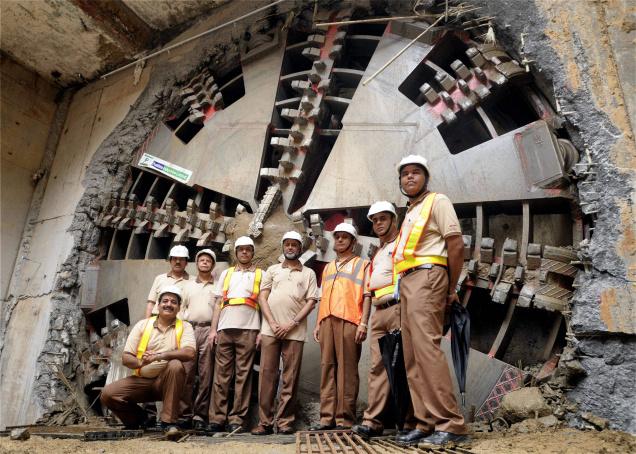
Managing Highs and Lows: Mental Health & the Construction Industry
11 of May of 2022
Health and Safety, at least in countries like the UK where I work, has reduced fatal workplace injuries from something like 4,400 in 1900, to 88 in 2020/21. It’s a marvel of the modern working world that human life is prized so much more highly than it used to be. Having reduced this problem to 2% of its original, we are left with the less concrete (pun intended) but no less serious issue to address of Mental Health in Construction.
![]()
As a trainer for the MHFA (Mental Health First Aid) and the Senior Health, Safety & Well-being Advisor at Ferrovial UK, the well-being part is becoming ever more important. I talk to people from all over the country; everyone in this industry knows someone who has taken their own life.
The Covid Lockdowns have caused an uptick in Mental Health issues, but in a sense it’s been useful. It’s the push that has made Mental Health a front-page issue.
The Causes

For better or worse, talking about mental health can still be quite taboo in Construction and the stereotypes about how to deal with adversity prevail: “Deal with it”, or “suck it up” are common responses; It can even become a competition: “What do you have to worry about?!” or “you don’t know what real problems are!”
The truth is, anguish is down to the individual. How we see the world, our culture, our religion or lack of one, our upbringing; what causes someone to stress out is relative. We need to abandon our own frame of reference and accept that anything can set anyone off. Brené Brown has a great video on YouTube about Empathy which I would recommend anyone to watch: Brené Brown on Empathy

You might be surprised to learn that many of those who fall into downward spirals are former Armed Forces veterans. Construction is a popular choice for vets; despite the hardships they may have faced in war, the outside world is actually far less structured, regimented and supportive than inside the barracks. Additionally, as the work of leadership experts like Simon Sinek and journalists like Sebastian Junger have shown, the sense of protection and belonging in close-knit, tribe-sized groups is something that frequently doesn’t exist in the real world; people can feel isolated in a culture of blame where no-one has their back, and everyone is looking out for themselves.
The Road Back:
I have been lucky in my professional life. Our company offers a lot of support and tries to ensure that, while errors are addressed, the answer isn’t simply to blame everyone who makes a mistake. Because we all make mistakes. Likewise, my goal is to spread the word that everyone’s mental health is a topic for conversation. We all have good days and we all have bad days. What is important is to ensure that one bad day doesn’t spiral into a bad week, a bad month, a bad year.
While it’s nobody’s fault for how they feel, it’s everyone’s responsibility. If you are a line manager that doesn’t know about someone’s difficulties at home, you might accidentally give a critique to someone who needs a friendly ear; if you are a co-worker who notices that someone’s a little off, ask them how things are going at home, maybe off to one side or out of work where they don’t feel intimidated. It could be the difference between life and death; if you are someone who plays their cards close to their chest in general, but happens today to be fretting about your daughter’s surgery tomorrow, should you be operating heavy machinery? A bit of self interest can actually be to everyone’s benefit.
Construction is a tough field and I don’t want to make people feel even more pressure than there already is. Quite the opposite: It’s about giving people the freedom to feel what they feel. It actually takes the pressure off. The more we talk, the less of a stigma there is. I talk to people on site, I talk about my own experiences. The more honest I am, the more likely they are to be honest back. It’s a two-way street.
Top Tips for Mental Health:
While everyone is an individual, and everyone has differing specific needs, the MHFA has developed a number of general activities that people can follow to improve low moods. Here is a handful to get you started:
- Exercise: Many people shudder at the very concept of exercise. But it does NOT mean looking like Dwayne Johnson or Beyoncé. It can mean stretching or jogging on the spot for a minute while the kettle boils or taking the dog for a walk. Humans are built to move, and physical activity releases endorphins, relaxes muscles, and triggers repair mechanisms in the body that reduce anxiety and promote a positive mood. Exercise in sunlight is even better.

- Feel-good activities / Positive coping strategies: Making time for something that you enjoy can go under this heading. Doing a puzzle, calling a friend or family member, or watching something light (avoid the news if you’re feeling bad. It triggers our negativity biases) are all ways to disconnect from your own thoughts and potential negative thought cycles (also known as “ruminating”).
- Removing or reducing negative coping strategies: Unfortunately, cigarettes, alcohol, and bingeing on bad food are considered negative coping strategies. Long-term, they ultimately lead to bad health and a worse self-image. Find a way to reduce them, little by little. One cigarette less per day is enough to feel more empowered and better about yourself.
- Volunteer: You might be thinking “how is more work, and unpaid work at that, going to help with the stress of work?” but you would be surprised. Humans are communal creatures after all. Money is nice to have, but what drives us is meaning, being useful to and valued by others. Those who volunteered during the Lockdown to deliver food or even just to chat with people through the window, fared better than those who stayed isolated.
The complete (but by no means exhaustive) list can be found here: https://mhfaengland.org/mhfa-centre/resources/.
Human mental health is a fascinating subject. I’ve given courses in and outside Ferrovial and every time I’ve learned something. People are so varied in their experience and always have something to teach me, regardless of their age, beliefs, and experience. We need to cherish those around us and ourselves a bit more. A little empathy is a good start.





There are no comments yet